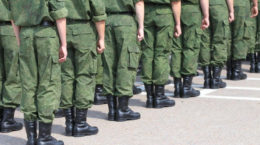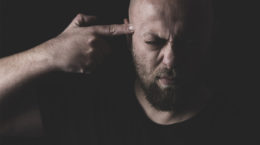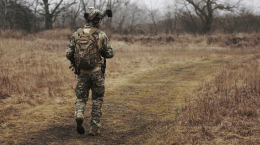Belarusian army might as well be called a place of imprisonment: people get there for a year – a year and a half, are deprived of all means of communication, encounter propaganda, torture, prohibitions and rare family visits. For example, if they find a mobile phone on a soldier, he will be punished by 15 days in a solitary confinement cell. Unfortunately, the prison-like atmosphere, humiliations and abuse lead to suicides and extra-judicial executions in the Belarusian army.
Every young man in Belarus is obliged to serve in the Belarusian army if he has no medical contraindications or official deferment. People with higher education must serve for a year, without higher education – for a year and a half. The conscription into the army is conducted twice a year: in spring and in autumn. Every year about 10 thousand young men are called up to compulsory military service in Belarus. Almost every year we get news about suicides, suicide attempts and extra-judicial executions in the Belarusian army.
On April 13, 2005, in the military settlement of Pechy in Borisov, three months after conscription, Maksim Kazheka died. Before committing the suicide, Maksim went AWOL from his military unit; he was found the next day in a forest 6 km away from it. The soldier hang himself on his own belt. A farewell note was found in his pocket in which he asked to “forgive everything”.
In June, 2006, in the military unit in Pechy, the soldier Aliaksandr Shamryn died. According to the official version, he was painting ceiling and walls in one of the buildings of the settlement when through inadvertence he fell down from the height of more than 2.5 m. Aliaksandr had been in a coma for 11 days before he died. Forensic report said that the soldier had multiple fractures of ribs, skull, jaw and a brain concussion. The findings do not allow to make a univocal conclusion that the injuries were obtained in the result of one fall.
On May 4, 2007, in the military unit in Vitebsk, Pavel Kozik was killed. The parents were told that the cause of death was acute ischemic heart disease. A year and a half later fellow soldiers of Pavel Kozik demobilized and decided to tell the truth: on that day Pavel got hit in the solar plexus by another soldier. Because of that, the private Kozik fell on his knees showing no signs of life: he did not breath, there were no signs of cardiac activity, no blood pressure, his pupils did not react to light, there was no pulse, there was fecal discharge. The soldier who hit Pavel was found guilty and sentenced to 6 months of home arrest.
On December 18, 2008, 19-year-old Anton Dalhaleu perished at a military shooting range under Rechitsa. The soldier was patrolling the district center, being on service in Gomel military unit 5525 in the police internal troops. He had one month left till discharge. According to the official version, the soldier slipped up while changing firing positions and accidentaly shot himself on the head. However, Anton’s parents do not believe in that.
On April 8, 2009, in the military unit near Zaslaul, the soldier Valery Shkut died. The initial and main version told to his mother was that Valery went to have a cigarette in a gazebo, felt bad and died. However, haematomas were detected on the body of the young man. A criminal case on the charges of involuntary manslaughter was launched. A year later the case got to the court. 10 soldiers were convicted for hazing and murder of Valery. Not a single person of the overhead personnel was convicted.
On August 26, 2012, in Vitebsk, a 22-year-old soldier of the 103th airborne division Yauhen Rudak was found hanged. Yauhen had served in the army for three months only. The main version is that he committed a suicide in the toilet. Not long before the tragedy, Yauhen talked to his friend on the phone. He said that he had been beaten by four people and asked the friend to come visit him as soon as possible, or he’d get killed. The psychological evaluation was that Yauhen was introverted and suicidal. The Investigation Committee joined the case, criminal proceeding was opened for incitement to suicide. Several soldiers and sergeants were convicted.
On April 11, 2013, during a shooting from a grenade launcher in the military unit 04147, the 20-year-old soldier Maksim Karachun was killed. By that time, he had served for four months only, it was his first shooting experience. The decision to open the criminal investigation stated that the weapon that killed Maksim was faulty from the start and should not have been admitted to the shooting training. The defendant in the case was the senior lieutenant Aliaksandr Volkau, who was the acting heavy-rocket-launcher platoon commander in the Minsk district of Uruchcha at the moment of the tragedy. Volkau was found guilty and sentenced to two years and six months of imprisonment in a correctional colony settlement.
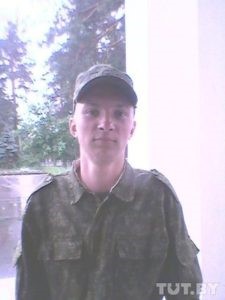 On September 1, 2013, in Pechy, 18-year-old Uladzislau Yahadkin died. The young man had served for only three months. The official cause of the sudden death was ischemic heart disease. Uladzislau’s parents say that in the last days before his death their son was strongly complaining of high blood pressure. “Uladzislau had served for only few months, when they brought me the body of my son, in a coffin in rubber flip-flops. One could see he had died suffering: his teeth were strongly clenched, like from tension, the capillaries were damaged all over his forehead – it had never happened before, his lip was black, the blood vessels were burst in his right eye”, — Liudmila Yahadkina, the soldier’s mother, told. Also, she was astonished that her son was taken to the army considering his state of health. “Still before the army he was in hospital for the treatment of renovascular hypertension. He had had problems with hypertension since school, although they had not put him under medical surveillance as a hypertensive patient”. According to the mother, the son did not complain of any beatings in the army. However, from what his fellow soldiers said, Uladzislau was often woken up at night, made run in a gas-helmet and put an enormous strain on his heart.
On September 1, 2013, in Pechy, 18-year-old Uladzislau Yahadkin died. The young man had served for only three months. The official cause of the sudden death was ischemic heart disease. Uladzislau’s parents say that in the last days before his death their son was strongly complaining of high blood pressure. “Uladzislau had served for only few months, when they brought me the body of my son, in a coffin in rubber flip-flops. One could see he had died suffering: his teeth were strongly clenched, like from tension, the capillaries were damaged all over his forehead – it had never happened before, his lip was black, the blood vessels were burst in his right eye”, — Liudmila Yahadkina, the soldier’s mother, told. Also, she was astonished that her son was taken to the army considering his state of health. “Still before the army he was in hospital for the treatment of renovascular hypertension. He had had problems with hypertension since school, although they had not put him under medical surveillance as a hypertensive patient”. According to the mother, the son did not complain of any beatings in the army. However, from what his fellow soldiers said, Uladzislau was often woken up at night, made run in a gas-helmet and put an enormous strain on his heart.
On March 21, 2015, in Borisov, the 22-year-old army conscript Mikhail Bevziuk died. He was found hanged in the territory of the military unit. His family believes it could be incitement to suicide. Two days before his death Mikhail called his brother and asked to visit him at the nearest weekend.
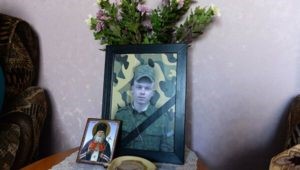 In August 4, 2016, in the military unit in Pechy, the 23-year-old soldier Siarhei Muruhau died. In the military unit they said he shot himself at the firing range during the training and called it “suicide”. The relatives are confident their son was incited to suicide. During the military service Siarhei became vary anxious, he called them in tears. Also, he often asked to sent him money, and the sums were significant. They were noticing bruises on the son’s body during his weekend home visits. No criminal investigation was open due to “the lack of corpus delicti”.
In August 4, 2016, in the military unit in Pechy, the 23-year-old soldier Siarhei Muruhau died. In the military unit they said he shot himself at the firing range during the training and called it “suicide”. The relatives are confident their son was incited to suicide. During the military service Siarhei became vary anxious, he called them in tears. Also, he often asked to sent him money, and the sums were significant. They were noticing bruises on the son’s body during his weekend home visits. No criminal investigation was open due to “the lack of corpus delicti”.
In October, 2016, in the military unit in Lida, the conscript Andrei Manonin hang himself. Before his death, Andrei had served in the army for 5 months. One evening his fellow soldiers found him hung in a barrack toilet. The Investigation Committee initiated criminal investigation for incitement to suicide. The investigation was suspended, then resumed on several occasions, but in the end, it was dismissed. The relatives of the deceased soldier are confident the reason he died was hazing in the army. Their most strong argument is the suicide note in which Andrei blamed specific people. Soon after the death of Andrei Manonin, his mother started getting phone calls with threats and demands not to tell anything to the journalists.
On February 10, 2017, in forest, the body of the 19-year-old Pavel Starenkau, serving in Borisov, was found. He had been missing from the military unit for three months, since November, 2016. Suicide was proclaimed as the main cause of death. An investigation was carried out, his fellow soldiers and relatives were interrogated. The findings of the investigation are unknown.
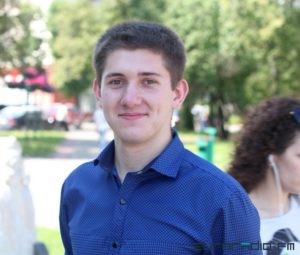 On February 18, 2017, in Pechy, the conscripted soldier Aliaksandr Statueu died. On the morning rise, during the lineup, the soldier fell unconscious. The measures for resuscitation failed and the doctor pronounced him dead. The announced cause of death was acute cardiac failure for the reason of ischemic heart disease combined with small focal serous myocarditis. All the detailed information has been carefully concealed from the relatives.
On February 18, 2017, in Pechy, the conscripted soldier Aliaksandr Statueu died. On the morning rise, during the lineup, the soldier fell unconscious. The measures for resuscitation failed and the doctor pronounced him dead. The announced cause of death was acute cardiac failure for the reason of ischemic heart disease combined with small focal serous myocarditis. All the detailed information has been carefully concealed from the relatives.
On March 31, 2017, in Pechy, Artsiom Bastiuk died. The 25-year-old software engineer was serving in the military unit in Borisov. A day before his death Artsiom called his parents, asked them to forgive him and said goodbye. The worried parents immediately called the command of the military unit and asked them to deal with the situation. They assured them that their son was going to be OK. Three weeks before Artsiom’s death, his parents came to the military unit to meet the leading officers. At that meeting, in the presence of his parents, Artsiom Bastiuk told the commanders about cases of hazing and listed names and surnames of those who were pressurizing him. After Artsiom’s death, the Investigation Committee started an investigation. Half a year later the case was closed, and nobody was punished.
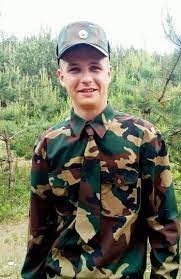 On October 4, 2017, a news appeared in the Belarusian media about the death of a conscript soldier of the 3rd Training Tank Company in the military settlement of Pechy in Borisov. 21-year-old Aliaksandr Korzhych was found hanged on a trouser belt in the basement of the medical unit. Aliaksandr’s family refused to believe in the official version of suicide and passed postmortem photos of him to the mass media: haematomas were clearly seen on the photos. His family also say that during his service in the army, Aliaksandr was extorted money from and threatened with physical violence.
On October 4, 2017, a news appeared in the Belarusian media about the death of a conscript soldier of the 3rd Training Tank Company in the military settlement of Pechy in Borisov. 21-year-old Aliaksandr Korzhych was found hanged on a trouser belt in the basement of the medical unit. Aliaksandr’s family refused to believe in the official version of suicide and passed postmortem photos of him to the mass media: haematomas were clearly seen on the photos. His family also say that during his service in the army, Aliaksandr was extorted money from and threatened with physical violence.
In the summer of 2017 Aliaksandr started asking his mother to transfer money to his banking card that had been taken by the warrant officer. On September 17, he got to the medical unit to treat acute respiratory infection, on September 26 he was dismissed and went missing. On April 19, 2018, the Investigation Committee announced completion of the investigation. Having examined the version of suicide, incitement to suicide and premeditated murder, the investigation came to the conclusion that Aliaksandr had been incited to suicide by the sergeants of his military unit. Three sergeants were found guilty of Aliaksandr’s death and were sentenced to 6, 7 and 9 years of imprisonment. However, Aliaksandr’s mother was not satisfied with the sentences, as a number of facts proved her son had been murdered, and not incited to suicide.
 On April 4, 2018, allegedly during the planned firing training sessions “because of the violated security requirements” 20-year-old Dzmitry Udod was killed: he got shot from a tank machine gun. The tragedy happened in the 120th Separate Mechanized Brigade in Uruchcha (a district in Minsk). Dzmitry Udod was a witness in Aliaksandr Korzhych’s case. Before the army he graduated from the vocational school in Mozyr and became a plaster-painter, then he worked at a collective farm, at a meat factory, and several times went to work in Russia.
On April 4, 2018, allegedly during the planned firing training sessions “because of the violated security requirements” 20-year-old Dzmitry Udod was killed: he got shot from a tank machine gun. The tragedy happened in the 120th Separate Mechanized Brigade in Uruchcha (a district in Minsk). Dzmitry Udod was a witness in Aliaksandr Korzhych’s case. Before the army he graduated from the vocational school in Mozyr and became a plaster-painter, then he worked at a collective farm, at a meat factory, and several times went to work in Russia.
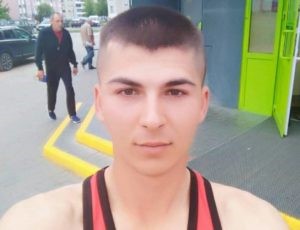 On September 5, 2018, in Slonim, the conscripted soldier Aliaksandr Arlou died. Before death the young man called his mother several times and discussed what he would do after returning home. The family was collecting documentation to invalid him out of the army. Aliaksandr’s mother said that the son had been constantly asking for money, but never said why he needed it. The woman became suspicious that he encountered hazing, and asked him directly about that. Aliaksandr answered: “I cannot say anything. They are listening”. In the first months of the military service the young man complained of psychological pressure. When they went to Minsk for two weeks to prepare for the parade, Aliaksandr called from there and complained it was worse than in Slonim. He made a hint he was being beaten.
On September 5, 2018, in Slonim, the conscripted soldier Aliaksandr Arlou died. Before death the young man called his mother several times and discussed what he would do after returning home. The family was collecting documentation to invalid him out of the army. Aliaksandr’s mother said that the son had been constantly asking for money, but never said why he needed it. The woman became suspicious that he encountered hazing, and asked him directly about that. Aliaksandr answered: “I cannot say anything. They are listening”. In the first months of the military service the young man complained of psychological pressure. When they went to Minsk for two weeks to prepare for the parade, Aliaksandr called from there and complained it was worse than in Slonim. He made a hint he was being beaten.
On September, 5, Aliaksandr talked to his mother for the last itme, and in the evening he was found hanged in the street-cleaning equipment storage room. There were two traces of cord around his throat, one of them from strangulation. Aliaksandr’s mother believes he was first strangled, and then hanged. “When we took him from the morgue, we saw a haematoma on his right elbow and on top of his right palm. Probably, he was trying to defend himself with that arm. They refused to show us the back of our son in the morgue. We were in a shock, they hold me under my arms to take me out, we did not think about insisting more», — she recalled. The Investigation Committee refused to initiate a criminal investigation for the fact of the death of a serviceman. Investigators came to the conclusion that Aliaksandr hanged himself, because he could not endure the difficulties of the military service. His mother never got the answers to her questions: why there were two ligature patterns, why there were antemortem traumas on his body, how he had got into a locked premises and why he killed himself if he had not had any suicidal thoughts.
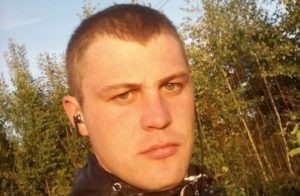 On September 8, 2018, in a forest near Grodno, the body of 26-year-old conscript Siarhei Yasiukevich from Slonim garrison, was found. There was a suicide note on him. He had two months left till discharge. His relatives said Sirahei had asked multiple times to transfer money to his bank card. The army said the suicide was not connected to the military service.
On September 8, 2018, in a forest near Grodno, the body of 26-year-old conscript Siarhei Yasiukevich from Slonim garrison, was found. There was a suicide note on him. He had two months left till discharge. His relatives said Sirahei had asked multiple times to transfer money to his bank card. The army said the suicide was not connected to the military service.
On June 2, 2019, 20-year-old Fiodar Bunas, who was serving in the army under a contract, committed suicide. The serviceman took a lot of medications and went outside where he suddenly fell ill. Somebody called an ambulance, but the doctors could not save the soldier. The media found out that the day before he had quarreled with his girlfriend. The indicated cause of death was drug-induced stroke. A month before his death, Fiodar had been found guilty of hazing. The serviceman had positive characteristics at Grodno garrison, performed his duties in good faith and was planning to become a warrant officer.
On June 12, 2019, in the military unit in Baranavichy, the soldier Dzmitry Khantsevich unexpectedly died. Dzmitry’s fellow soldiers found him unconscious in the locker room. During the conducted investigation it was allegedly detected that on June, 11 all the servicemen of the military unit 7404 were sent to a square at 2 p.m., where they were forced to do physical exercises for two hours in the temperature +30°C.
On July 13, 2019, at the 11th Mechanized Brigade in Slonim, the conscript Andrei Molis attempted suicide. He had been called up to arms in November, 2018. The young man sliced open his veins. Doctors managed to save him.
On July 23, 2019, Andrei Shcherbakou, a private of the Reconnaissance Battalion of the 6th Guards Separate Mechanized Brigade based in Grodno, sliced open his veins. The soldier had been serving in the army for 2 months and could not endure the hazing. The young man was saved. Private Shcherbakou, who cut his veins open due to hazing, was then promised to be sentenced to 7 years of imprisonment under Article 447 of the Criminal Code of Belarus (evasion of military service by self-injury or by other means).
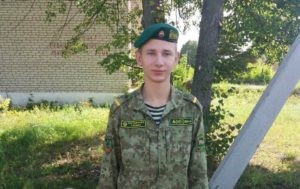 On November 20, 2019, 19-year-old Ruslan Zaitsau was found dead in Mozyrsky border guard detachment. The Border Committee voiced a version that the soldier committed suicide by shooting himself. His relatives do not believe that, they think Ruslan was inadvertently shot and killed. Their son’s fellow soldier, who he had been going to the checkpoint with, suddenly disappeared. In the military unit they said he was transferred to another unit. The Investigation Committee rejected the exhumation of Ruslan’s body.
On November 20, 2019, 19-year-old Ruslan Zaitsau was found dead in Mozyrsky border guard detachment. The Border Committee voiced a version that the soldier committed suicide by shooting himself. His relatives do not believe that, they think Ruslan was inadvertently shot and killed. Their son’s fellow soldier, who he had been going to the checkpoint with, suddenly disappeared. In the military unit they said he was transferred to another unit. The Investigation Committee rejected the exhumation of Ruslan’s body.
On June 8, 2020, a 20-year-old serviceman of an anti-aircraft missile brigade Siarhei Valoshyn died from a gunshot injury. He had served in the army slightly over six months. It turned out, that day Siarhei locked himself in the weapons rooms, shot and deadly wounded himself. Before that, neither his behavior nor mood seemed suspicious to his friends: he behaved as usual, followed the news, watched web streams, listened to music. It’s known that Siarhei did not want to serve in the army, but he could not avoid it. He studied at a chemical and technology college on the specialty “technology of woodworking industries”, and then worked at a factory. He was not very interested in socializing, but had a lot of friends on the Internet, with similar interests. Siarhei understood that he wasn’t good at every task, and by certain indicators was worse than other soldiers. The trial on the case started in February, 2021. The defendant was the 24-year-old contract serviceman, chief of the section of receiving and transmitting devices of radio-technical company, who had not controlled the safety of weapons and day duty.
On January 15, 2021, a serviceman of Pinsk border guard detachment attempted gun suicide while on duty. The 20-year-old conscript had been in mandatory military service in border service agencies. He had positive characteristics at his place of service. On the day of the tragedy, he was on guard duty for border strip entry control. Fortunately, the suicide attempt was not successful, and the soldier was saved.
On January 25, 2021, another suicide happened in the Belarusian army. A conscripted soldier shot himself in Smarhon. He was 18 years old and served in the military unit ensuring security of the Belarusian nuclear power plant. The serviceman was on guard between power units of the nuclear power plant and shot himself in the neck out of the government-issue weapon.
On February 19, 2022, in one of the military units of Grodno garrison an incident happened: a 19-year-old serviceman, a conscripted soldier, was wounded. As the press service of the Ministry of Defense informed, the incident had happened “in the result of breaching regulations relating to the management of weapons in a place of permanent deployment of one of Grodno garrison military units”. The next day the young man died in the intensive care.
Conclusion.
Service in the Belarusian army is not an honor any more, it is a fear to be killed in the result of an accident, inaction of the commanding officer, a wrong diagnosis or hazing. Now, there is another danger that the Belarusian soldiers are facing: to die in a foreign land in the result of the warfare launched by a foreign dictator and come back home in a a zinc coffin.
Nevertheless, we hope that thanks to our campaign “NO Means NO” we will manage to prevent our young men from dying in Ukraine and in Belarus.





